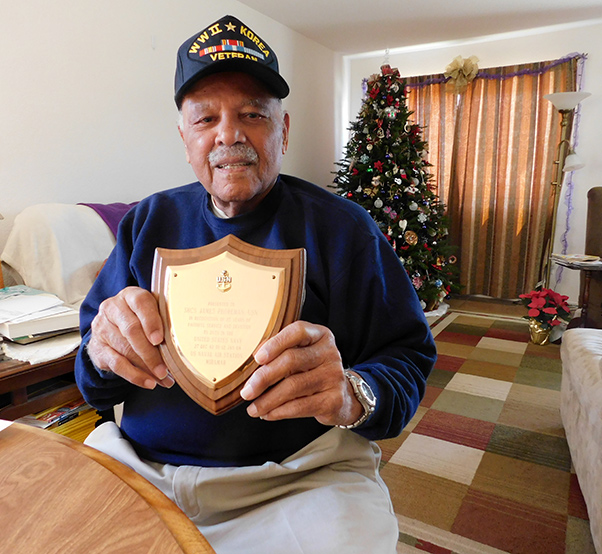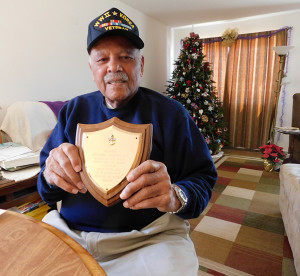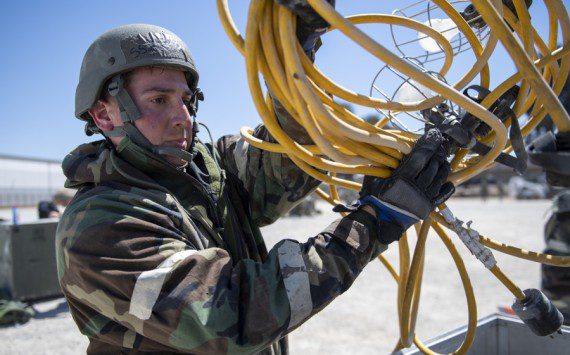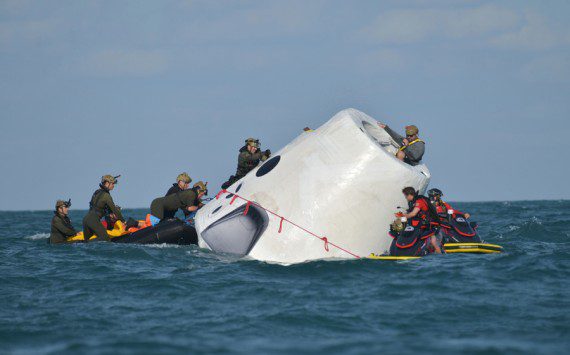James Phoreman, a veteran of World War II and the Korean War is pictured at his home in Lancaster, Calif. Hefs proudly holding up a plaque commemorating his 26 years of service in the United States Navy.
Heroes come in all sizes, shapes and yes, colors too — A favorite among heroes is the American hero, of which this country has many …
Lancaster, Calif., resident James Phoreman is an American hero. You won’t hear that from Phoreman, because he doesn’t consider himself a hero. He is, however, an amazing man full of the stuff that heroes are all about.
Phoreman is a man of a considerable amount of pride — pride in himself, his family and his country, but he didn’t always feel that way.
Born in Hattiesburg, Miss., Dec. 26, 1922, Phoreman, an African American, lived through an era when segregation was the norm.
As a young boy, Phoreman didn’t think much about segregation or what that implied, it was just the way life was. A way, however, that caused Phoreman to feel inferior to others.
Raised by his mother, a single parent, the Phoremans were poor, but so were most all Hattiesburg residents at the time, and Phoreman didn’t think much about that either.
His childhood years were full of dreams. One special dream was to one day become a sailor, of being part of something big — of having the chance to feel equal.
In spite of the harsh realities for people of color at the time, Phoreman loved and respected people, he loved and respected his country.
Then, on that infamous day in December of 1941, America was attacked at Pearl Harbor, Hawaii — and soon after, Phoreman, then 19-years old, enlisted in the U.S. Navy.
“My country was on the verge of war and I felt if we lost the war my generation would probably be destroyed,” Phoreman reveals.
So off he went to the United States Naval Training Center in Norfork, Va., for six weeks of basic training.
“I felt that my country needed me, and I wanted to fight!” Phoreman said.
“I was accepted as a mess attendant, that was the only way ‘negros’ could join the Navy,” he recalls.
After basic training Phoreman was assigned to a patrol craft, the PC451 and off to Key West, Fla., to patrol the American shores in an effort to keep the country safe from enemy invasion.
“On occasion we picked up contact [sonar] from German submarines off the coast of Florida and we’d drop depth bombs,” he remembers.
The crew of the PC451 also, on occasion, dropped what they called “mouse traps” which, Phoreman explains, were fired off from a rack. The depth bombs, Phoreman said, would only go off if they hit something.
The PC451 chased enemy ships from Florida to Cuba, dropping depth charges when conditions were right, “We have, on occasion encountered oil slicks and uniforms surfacing after a depth drop, but didn’t hang around long enough to know for sure if we made a kill,” he said. He said he and the crew of the PC451 were happy they were never fired upon.
When asked what he felt during those scary times, Phoreman says they really didn’t have time to get scared, “The idea was to get the job done,” he said. Their job was to keep the American coast safe.
A year later Phoreman was assigned to a destroyer escort ship, the Henry R. Kenyon. He proudly served on the Kenyon for the next three years. Homeported in Boston, Mass., the Kenyon escorted convoys to and from Africa and England.
“During those escorts we never lost a ship,” Phoreman proudly states. A feat to be proud of considering they would escort as many as 50 ships at a time across the vast Atlantic Ocean.
Phoreman said they constantly picked up contact, but never dropped any bombs during convoy duty.
Sharing some memorable experiences Phoreman recalls a time when he was on liberty in Scotland. “I was relaxing in a bar with some shipmates when someone came up to us as asked whatever happened to Pretty Boy Floyd. I laughed and said I didn’t have a clue and the person left. We considered later that might have been code for someone and only the contact person would know what that meant and how to answer.
His most memorable experience, however, was when a sister ship sank and Phoreman’s mother was notified that he was lost in action. When he returned home his mother passed out when she saw him, “She thought I was killed,” he said.
Another unpleasant experience Phoreman encountered was after the war while traveling home loaded down with a duffel bag containing all his belongings during a heavy rain storm, he stopped in a restaurant to call home but was turned away. Because of his color, he wasn’t allowed in the eatery even though he explained he only wanted to use the phone.
“It’s been a long road ma’am,” he told this Aerotech News reporter.
Phoreman didn’t let negative encounters hold him back, instead he put his love for his country and people first and pressed on. He chose the military as his career and stayed in the Navy and later served in the Korean War as well.
Today he proudly shows letters of appreciation he has received from his commanding officers and talks about how far he came from mess attendant to being put in charge of a Navy Exchange store. “I was solely responsible for $8 million worth of merchandise a year that came through the Exchange,” he says with pride.
Phoreman says having been given all that responsibility was one of the high points of his military career. “It gave me a chance to prove what I can do” he says.
Today Phoreman says he has no regrets, “I proved I could do the job that any other person could do,” he says.
Would he do it again? …
“In a split second I would do it over again, but I pray we never have to,” Phoreman says.













